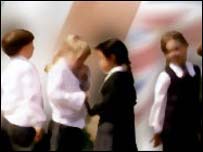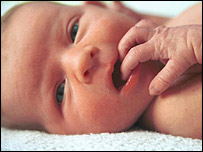 Children who do daily exercises, mimicking a baby in the womb, have shown dramatic improvements in maths and English, new research suggests.
Children who do daily exercises, mimicking a baby in the womb, have shown dramatic improvements in maths and English, new research suggests.
The technique, Primary Movement, has been championed by Dr Martin McPhillips from Queen's University Belfast.
Until recently, it had not been formally tested. But the first academic study has startled the sceptics.
Primary Movement is based on the fact that while they are still in the womb, babies are practising for life outside.
They go through a range of movements and reflexes while they are still foetuses, but usually grow out of them by the time they are one year old.
However, some never get past the habits formed as a foetus.
For some reason, that has been shown to hold back their school work.
However, getting pupils to mimic those baby movements every day in class is said to bring astounding improvements.
Dr McPhillips, a psychologist who developed the programme, said: "We adapted the foetal movements for school children.
"Sometimes we disguised them in songs and dance. The programme is a re-enactment of foetal life."
He admitted that it sounded "a little ridiculous".
"But when you see the foetus move, it does make a lot more sense," he said.
"These are very powerful movements and they are at a critical point in development when so much of the central nervous system for example is being laid down."
Many primary schools have tried the movement therapy but, until recently, there had been no formal research.
Progress followed
However, a new study has measured the effect of the special daily exercises.
Dr Julie-Anne Jordan-Black followed the progress of 1,000 children from 13 schools.
"Some children received the primary movement programme, some didn't and they were a control group," she explained.
"The results have shown that the children who received primary movement significantly increased their standard score in maths, spelling and reading."
Schools involved in the study reported good results. Karen Smyth of Holy Family school in Teconnaught, County Down, is an enthusiast.
She reported jumps in standardised scores following the use of primary movement.
"Normally, the child would move two to three points from year to year," she said.
"Maths was the same. It went right through from lower ability children to the top of the class."
The research was paid for by the Council for the Curriculum, Examinations and Assessment (CCEA).
However, before it is introduced across Northern Ireland, Carmel Gallagher from CCEA wants more proof that it really works.
"The research is coming through quite strongly that this movement programme has an impact on children's reading age," she said.
"But let's make sure that this is the case, can this research be replicated outside Northern Ireland and then, if absolutely proven, I think that CCEA and the Department of Education would be hugely interested in seeing something like this applied right across the education system."
The researchers said they had now done that and a study in Australia has been completed which shows similar improvements to those reported by teachers in Northern Ireland.
Article taken from http://news.bbc.co.uk/2/hi/uk_news/northern_ireland/4828146.stm
make some comments about the article.
What do you think about it? Are you agree with it?



